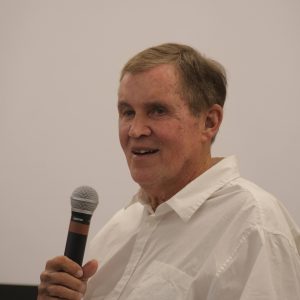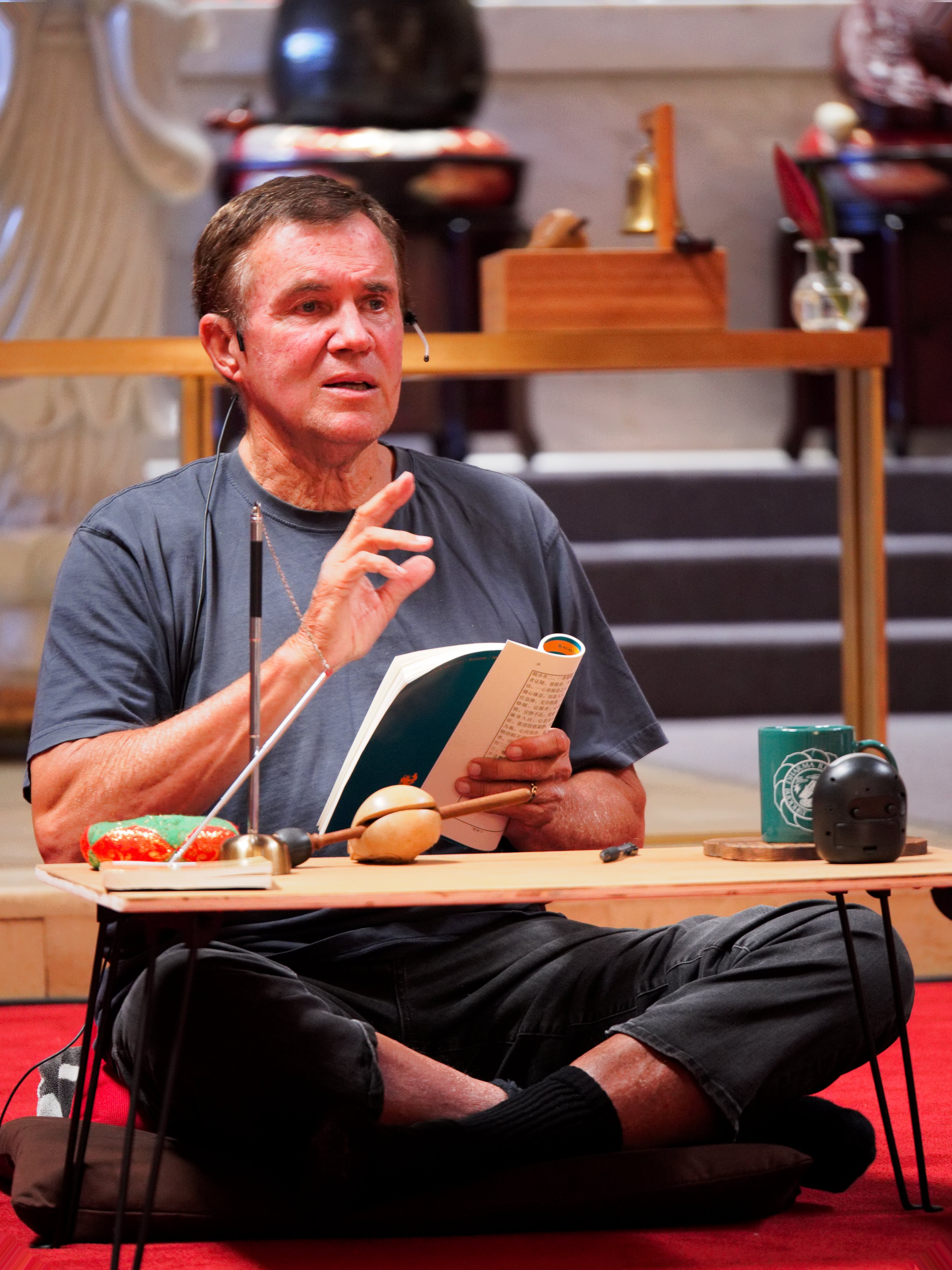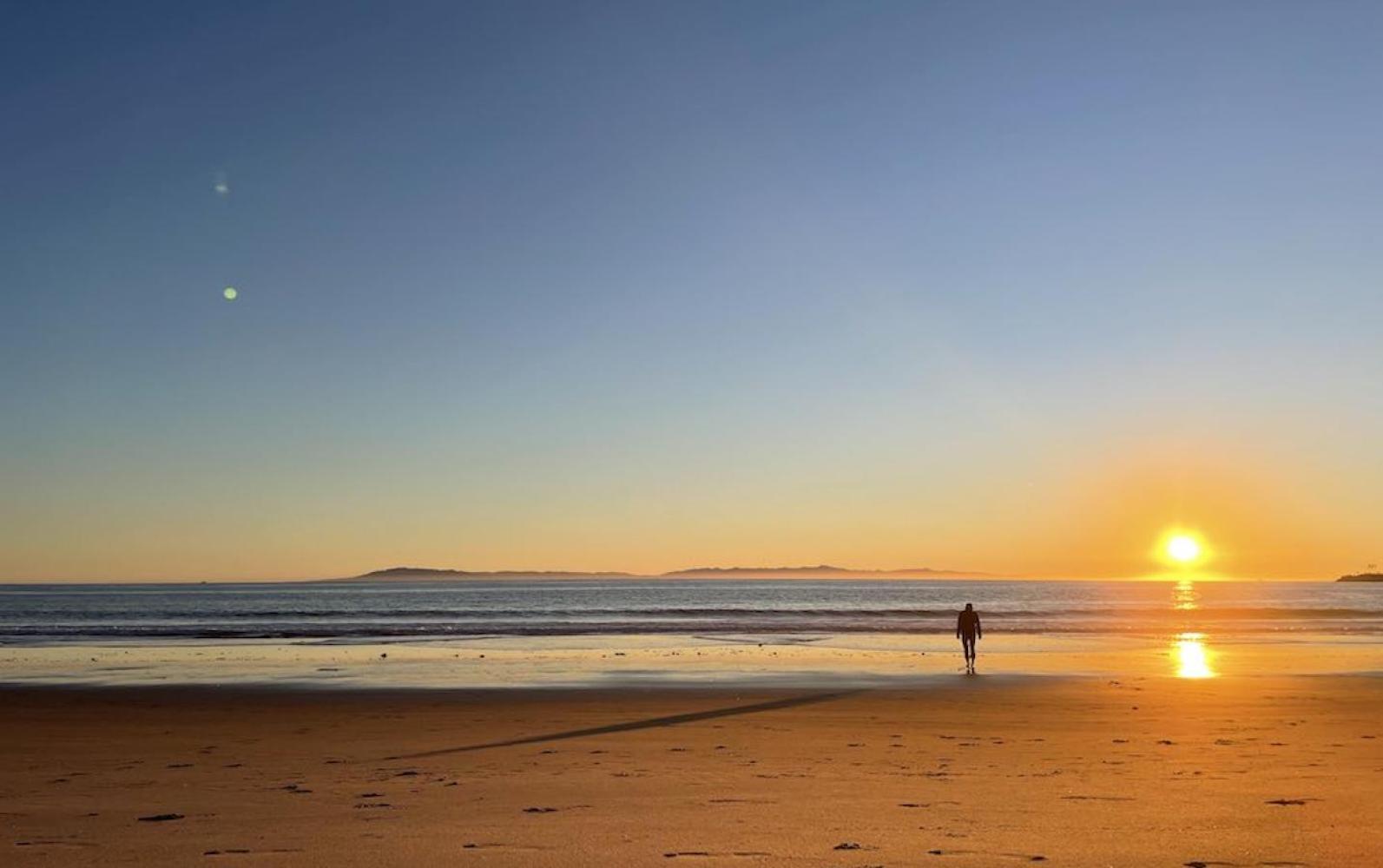
Editor’s note: Below is an edited excerpt from a talk that Professor Doug Powers gave to a group of DRBU cultivators in May 2020, when California was only six weeks into the shelter-in-place ordinance. Now we have entered the year of 2022, we still find it very relevant to today’s situation.
Any kind of major crisis, either your own crisis or a collective crisis, is such a good time to cultivate because it puts into question the fundamental sense of your narrative of yourself in terms of all of what you’ve created about who you are from the time you were a child.
A cultivator is someone who is swimming against the river as a metaphor. The river is always flowing; you’re not going to stop the river from flowing, but if you start trying to swim against it, slowly but surely you gain strength in your arms. You’ll be swept with the river for a long time, but if you keep swimming you start building up your arms. The river is the flow of the seeds from the eighth consciousness. This is the river flowing. And that’s flowing and the conditions in which you are that you are born into and those conditions that come about from a very complex interrelationship between the eight consciousness and the senses and your attachments to certain imagined self and the imagined world around you that you’re projecting into and all that creates this huge complex as what you think you are.
So a cultivator is swimming against the tide, and they have to have confidence that if they swim, that if they keep working at it for long enough, they’ll make some progress. And everyone is going to have a different experience of it because the flow of the river that you’re facing is different for each one of you.
Each of you have more or less constructed a successful life. But everything that you have constructed beyond the basic level of survival is problematic. When the Buddha is talking about the middle way in the terms of cultivation and practice, he’s talking about an ideal place at every given moment and every given lifetime where your strategies of intelligence and wisdom are used to construct the context in which the greatest amount and most profound not only cultivation can occur, but if we’re talking Mahayana, the greatest amount of positive effect on the totality of sentients can occur in terms of your generosity, loving kindness, compassion, joy, equanimity.
A crisis is a super opportunity because it’s sort of like the place where the real crashes through the imagined. If I sat down with each of you, I could go through the entire imagined that is the construction of your existence. And we could see what’s working and not working, and we can see that within what you think that is working, based on the conditions of what you think are pleasurable, not pleasurable, and the narrative you’ve created about what you want and don’t want, how it’s working or not working to get your needs met or not met. It’s all useful, but all, however, in the imagined and the conditional. And cultivation is attempting to try to get to the place of our basic awareness that’s neither totally in the imagined nor totally within the strategic elements of the conditional. It’s trying to find the sweet spot where the awareness, the fundamental awareness, has some breathing space, where the fundamental awareness can have a little vacation from all the activities that it’s engaged in.
In a crisis, we’re forced to try to find a new way to come up with how to come at the imagined. If we are trying to affect the conditional, we might be very frustrated because the conditional is too big for us to take on. By the definition, crisis is a collapse of the ideological, the overall framework in which we assume reality was. So that could be disappointing because you may actually be depending a lot more than you think on a kind of imagined general reality of either human nature or human society or human community that actually exists. When that happens, it shakes you up.
Another kind of crisis is a personal crisis, which comes from that same mechanism. For example, you are hanging out with someone, and you may fall in love with them. You may assume they are having the same experience of the interaction you do. Then, at some point you find out that they are not having the same experience as whatever it is you think is happening. What’s going on is actually completely different! All of a sudden, there is this huge wake-up call where you find out that they are going to do something else, or they’re really angry or something.
If you look at all crises, one of the most basic crises is the body. You think your body is going to continue to function indefinitely and “Surprise!” Every one of you will find out it won’t at some point. As a cultivator, the stillness of your six consciousness is actually dependent on a functional body.
So I’m just giving you examples on all kinds of levels in which a crisis can happen. As a cultivator, the crisis forces you to do something that you probably would never do by yourself. As long as the structure of your reality that you imagined to the conditions work, your meditation is a break for half an hour, an hour, in the morning trying to calm yourself enough to deal with the reality system that you’ve constructed and make yourself a little calmer with your friends, your condition, your kids, your job, your co-workers, the environment, yourself. This is not really looking at the ground of awareness that isn’t dependent on both the imagined and the conditional.
Without a crisis, there isn’t enough motivation for a cultivator to look at this ground. For a cultivator, a crisis is a wonderful opportunity because they don’t come along that often for a successful intelligent regular type of person.There are actually very few moments of what we would even call a questioning of the fundamental nature at the level of identities. So when it occurs, it allows us to use the opportunity to actually experience our sense of awareness in a very vulnerable, unstable way with a lot of solitude and a lot of nothing. “I can’t depend on what I’m feeling to be stabilized through the system that I’ve used up until this moment. Therefore I have to look for where I can observe the awareness that has some solidity of observation that isn’t dependent on the imagined and conditional construct that I have created.”
That acutely forces you to go to a different place. It’s not a different awareness because you are always using the same awareness, but it gives you an opportunity to look deeper into that awareness and see how dependent it actually is and how it isn’t really unconditional. The awareness that you’re using at the source of your cultivation is very dependent on conditions for its stability. And so in a moment of crisis, it forces you to have to find a realm of stability from a different set of surrounding aspects. You absolutely have to be open to the instability of it. You have to be patient with the vulnerable instability to let something else emerge as the ground of your awareness than where that was before. The only way you can get there, though, is you can’t return to the same conditional place.
The only door through that is recognizing the solitude of your process. It doesn’t matter if you are in a lot of communication with other people. Ultimately, your ability to relate to those people in a positive way will fundamentally depend on how at peace you are in your solitude. If you can actually learn to be comfortable in nothing, which is a place that doesn’t depend on the creation of the imagined. It may feel weird. It may get bored. It may feel anxiety. It may want to move. You have to be extremely patient because as soon as you touch it, it wants to move because it’s not totally willing to settle in that “nothing” place.
Now from that not moving, remember the goal of this is not to isolate yourself. That’s not the point! The point is to have a place from which you are coming that’s now been induced by not being able to use your traditional imagined self, a place that is more grounded that has less of the imagined and conditional built into it as a kind of safety valve of yourself.
If you can develop this awareness at this place in these times, it is a much more fundamental, grounded place to observe from. It’s much deeper in the sixth consciousness. We are creating space in the sixth consciousness, which is like pure awareness without so much content. It’s not pure in the ultimate sense because the sixth consciousness still has a lot of self. It still has a lot of “my” awareness in it. And we still have the seventh consciousness. So don’t get too carried away here. We’re just talking about a kind of grounding here of the basic human experience. We’re not talking about anything transcendent.
But you have to develop this place really solidly and settle in it for quite a bit of time before you open the door to what’s described in the Lotus Sutra and the Avatamsaka Sutra. You are not going to be able to see it until you spend some time in this space that actually is not dependent and imagined.
As far as your surrounding conditions, it’s interesting because if you could actually develop a confidence in that kind of empty awareness that isn’t so dependent, there emerges a freedom and a confidence in actually being able to see your reaction. Because the only way that you’re going to be able to change the fundamentals is having a stillness in the sixth consciousness that you could actually observe the movement of your mind. If you can not observe it, there’s no way to change.
So all we’re talking about here is the place where you can observe from so you can actually observe, and then you can see when a sense experience or a thought, a seed or whatever arises into the sixth consciousness and how the problem isn’t the seed, not the sense. We’re not trying to avoid experiences. What the Buddha is primarily talking about is, when he says the problem is discrimination, he means if you could watch the mind from the place I’m talking about, then you can see that when a sense comes up that along with that sense experience, or with that thought, with that emotion, there’s an accompanying evaluation or interpretation or judgment. That’s where the problem lies. You’ll see it happen every time. You’re walking along, and you see a person, there’s judgment. You see a car, there’s a judgment, You see a house, there’s a judgment. You walk down the street, there are all kinds of judgments. Every element of both yourself, and what’s coming into the senses is continually judged and interpreted. If you look at where the emotions are, they are actually in the interpretation, not in the sense experience. The sense experience is neutral. Even emotions are neutral in their first arisel. It’s the reaction, not the emotion, that’s not neutral. One of the things you have to do in this is be patient with what’s arising.
So when you’re trying to find a space of awareness, you have to be very patient, to be okay with whatever arises. But have a distance, even a slight distance from what’s arising, to not go with it in a way that then feeds it with endless further interpretations, reactions and fears and desires, the whole apparatus of the mind.
So in a crisis, you’re forced by the circumstances to go to a different place in your awareness, in order to survive psychologically as well as a cultivator. And you don’t go there as a way of avoidance but as a place of awareness. This place is a super aware place that you can observe what’s going on from.
From this place, you can not only observe your own process internally, but you can observe your reactions to everyone else around you. You can begin to see how you’re interpreting everyone around you within the constructs of how you interpret reality. You’ve created an entire reality around you, of the people that are around you, why they are around you, what you are doing with them, what’s going with them, and so forth. It has already built into it an elaborate set of feedback loops that actually keep you occupied in a not-very-helpful way from the view of cultivation. Since you already have chosen certain relationships for whatever reason, you can use the opportunity to see into what you’ve constructed as the imagined projection in the conditions of what you’ve constructed around you. You have to look into those in a new way. This is a great opportunity to practice generosity, loving kindness, compassion, and joy, where you can now take the positive elements of cultivation and project them. Now you can try out these kind suggestions of being open-hearted, open-minded that the Buddha made in terms of paramitas and the basic attitude toward humanity.
Try to give up judgments for patience, generosity, loving kindness, and cooperation. So you change the dynamics of the interactions that you already find yourself in and see how a totally different approach from that place you are cultivating would work.
So it’s doing basically two things: One, treating the environment through the paramitas and through loving kindness, compassion, joy, and equanimity and two, taking the opportunity to look through your own process of what you’ve created and trying to find a place that you are comfortable with in each present moment, a place where you have a little bit of freedom and a little bit of awareness to observe your process at a deeper level.


